Simplifying Financial Confusion
LEARN CASH FLOW HACKING TO REACH FINANCIAL FREEDOM
Used by 90% of millionaires to reach their financial goals 4x faster
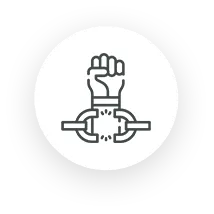
Achieve Financial Freedom Through Cash Flow Hacking
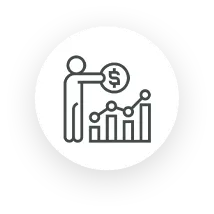
Increase Your Lifestyle While You Build Your Wealth
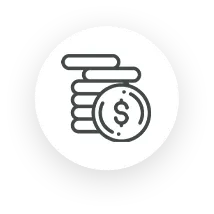
Position Yourself to Thrive in Market Downturn
YOU SHOULD NOT FEEL OUT OF CONTROL ABOUT YOUR FINANCIAL STRATEGY

Have easy access to your money in case of emergencies and opportunities

Use the investment strategy 90% of millionaires use

You deserve a clear plan to consistently grow your money and avoid market uncertainty

Have a guide and advisor that has your best interest in mind

Do not overpay in taxes

Stop guessing at the best vehicles to protect and grow your money

Essential Preparation Before Investing | Core Values For Investing
This article is a written adaptation of the video you can find on our YouTube channel, LIFE180.
Ensuring that your financial decisions align with your values and beliefs is crucial. It's not just about accumulating wealth; it's about using money as a tool to create the life you desire. For me, money is a means to an end, enabling the fulfillment of personal goals and the realization of a meaningful life.
Who do you want to be at the end of your life? What do you want to be known for? What do you want your legacy to be? Remember, you are not just a salesperson; you are a leader. You have the power to influence people to act in their own best interest, guiding them toward making decisions that align with their values and long-term goals.
What worked for our parents or grandparents is not going to work for us. Identify the actions you need to take daily, monthly, and annually to reach your goals. Once you figure that out, life becomes easier. Tailoring your financial strategy to your unique circumstances and staying committed to these actions will help you achieve your financial objectives and create a secure future.
People Are Struggling With Money Because It Is Not In Alignment With Values
Now, if you watch my content, you know I do a thing called the LIFE180 Pyramid. I talk all the time about the importance of financial structure. And while that's all true, what I think is really important is I wanted to go down this path a little bit deeper and talk about not just what to do before you invest, but how to make sure that you can go down a process and get your money in alignment with your values and beliefs. That's a phrase that I use all the time. I believe that people are failing with money because their money is not in alignment with their own values and beliefs.
And I think the challenge behind that is while it's true, a lot of people go, "Chris, what the heck does that even mean?" What I want to do in this article is really walk you through a process and an exercise.
Before you invest, before you save money, before you think about building your business, real estate portfolio, investment portfolio, or start planning for retirement, it's important to understand where you are going. What are you trying to build? What do you want this life to be for you? We only get one shot at this thing called life.
Unfortunately, while it feels super long, life is super quick. It flies by. I'm 44, I have three kids, and for me, it's flashed by in an instant. My daughter, who is 12 years old now, feels like she was born yesterday. I was just thinking about it yesterday, she'll be off to college in six years. It feels like she was just born, and I know grandkids are right around the corner. I don't even know what's coming next.
So these are the things that happen, and we need to get really, really clear about what we're trying to accomplish. In this article, I'm going to walk you through a process that I guide my clients through. I encourage you to really dig deep and think about this. If you're interested, here's a spoiler alert: I encourage you to set up a call using the following link to schedule a clarity call.
When you meet with someone on our team to help with your personal finances, we'll guide you through this exercise and worksheet. We're integrating it into a comprehensive package and workbook for people to navigate this process effectively.
That way, they can all engage in this exercise of clarifying their goals. It's crucial to adopt Stephen Covey's principle from "The 7 Habits of Highly Effective People" of starting with the end in mind. This enables you to reverse engineer a plan to reach your desired destination. Without this clarity, chances are you'll fall short of your goals.
So without further ado, let's dive in.
What Is Your Money Paradigm? Change Your Thinking About Money
The first step is to gain clarity on your money paradigm. What are your fundamental beliefs about money? If you were to take a look at the back of my shirts in my videos, you'll see a statement I often share: "Change your thinking, change your actions, change your life." This underscores the importance of aligning your mindset with your financial goals and actions to achieve meaningful changes in your life.
Life 180 represents living intentionally for excellence. The acronym L-I-F-E stands for living intentionally for excellence, while 180 symbolizes turning your life's outcomes around. Many people aren't achieving the fulfilling life they aspire to, and LIFE180 aims to guide individuals towards living a life they can truly be proud of.
The question becomes: What actions do you need to take? What changes are necessary to turn your life around? Many people aren't intentional about defining what they want to achieve in life. If you're uncertain about your goals, how can you expect to achieve them? It's crucial to clarify your aspirations and take deliberate steps towards realizing them.
To navigate this process effectively, it's essential to clarify our beliefs about money. As we often emphasize, transforming our thinking ultimately transforms our actions, and those actions, in turn, reshape our lives. A foundational step is to define the life we aspire to lead. Recognizing that our actions are the product of our beliefs and thoughts underscores the importance of aligning our financial decisions with our long-term goals and aspirations.
First and foremost, we must begin with our mindset and beliefs about money, our personal paradigms. It's crucial to understand what being wealthy or rich means to each of us individually. For me, rooted in my core values and life priorities, freedom stands as my ultimate, non-negotiable core value.
To me, wealth transcends mere money, it embodies time freedom and mobility. It means having the flexibility to travel, explore new experiences with my family, and the ability to step away from work at any moment to prioritize family time or take a well-deserved break.
I work harder than most people you'll ever meet because I've structured my life to be on my terms. This means I can choose to spend time with my kids, travel, and enjoy life with my wife whenever I want.
The freedom to choose when and how I work allows me to love what I do. I feel a strong calling to help others, and my view on money is clear: it's a tool to shape the life I desire. I urge you to reflect deeply on what money means as a tool for your life.
How To Use Money As A Tool To Create Your Dream Life
What's your perspective on money? What beliefs and financial strategies are you using to craft the life you truly want to live? I've found that it's not just about money itself, it's about using money as a tool. Money serves as a means to live our fullest and most fulfilling lives.
To achieve this clarity, it's crucial to understand that these answers are deeply personal and unique to each individual. What holds significance for you? What do you value most in life? What impact do you want to make? Are you prioritizing the people who matter most?
When was the last time you intentionally focused on creating these aspects of your life? Making an impact in areas that matter, serving those closest to you, and using money as a tool to construct a framework that aligns with your values? It's about living powerfully for those who mean the most to you.
Ultimately, when we face our mortality, whether gradually or suddenly, we don't want our last thoughts to be filled with regrets about missed opportunities, unfulfilled relationships, or wishes for more meaningful actions. It's crucial to live intentionally and purposefully, striving to create a profound impact for those who matter most to us, ensuring we live a life of purpose and fulfillment.
The key lies in being intentional about our goals, our purpose, and the impact we want to make, especially on those closest to us, our family, friends, and community.
What Do You Believe About The World As It Pertains To Your Money
Next, it's crucial to reflect on your values and beliefs. Values form the bedrock of our decision-making, influencing how we perceive ourselves and others, and shaping our daily actions. Beliefs, in turn, are often derived from our core values, guiding our attitudes and behaviors over time. Understanding these foundational aspects is essential as we navigate our financial and personal journeys.
Our core values profoundly influence our perspectives, shaping our self-expectations and our expectations of others. These values are pivotal in how we approach life, guiding our actions on a daily, monthly, and yearly basis within our families and communities. They serve as the driving force behind our decisions and behaviors, ultimately defining how we navigate and contribute to our surroundings.
One of my favorites is "The Ant and the Elephant" by Vincent Pacenti, a book I highly recommend picking up on Amazon. It delves into the profound influence of our subconscious mind and the role our beliefs play in shaping our lives.
In "The Ant and the Elephant," Vincent Pacenti discusses a study demonstrating that the human brain only expends full effort on endeavors believed to have a 100% chance of success.
It's not necessary to believe unequivocally in your success; rather, understanding that you have the potential for success is crucial. This distinction is vital. Many people operate on autopilot, driven by societal expectations rather than aligning their financial decisions with their personal values and beliefs. The system often dictates what we should do with our money, fostering unconscious actions rather than deliberate, purposeful choices that reflect our true priorities.
What I observe now is that many people simply funnel their money into a 401(k), follow the conventional path of education, employment, and retirement savings, hoping to achieve financial freedom after decades of hard work. It's like running on a hamster wheel or in a rat race for 40 years, believing there will be a pot of gold waiting at the end of the rainbow upon retirement. However, this expectation often falls short of reality.
Statistics reveal that 95% of people in the United States are reaching retirement age or are on track to do so without being able to sustain their current standard of living. This alarming figure underscores a stark reality in the most prosperous country in history, making it one of the most disheartening statistics I know.
When considering your values and beliefs, it's crucial to reflect on what you truly believe about the world around you. For me, this reflection led me to relocate to the Dominican Republic because I felt that the direction the United States was heading did not align with my core values.
I'm not suggesting everyone should take such a bold step, but it's essential to consider your beliefs about the government's financial responsibilities, such as debt, deficits, and unfunded liabilities.
Reflect on your expectations regarding future taxes, are they likely to rise or fall? There's no one-size-fits-all answer, but thinking about these factors helps you gauge where you believe things are headed. Consider your views on inflation, interest rates, and how these factors might shape the country's trajectory.
The Financial Strategies That Worked For Our Parents, Won't Work For Us
The reason I emphasize this is because what worked for our parents or grandparents is unlikely to work for us. The market is cyclical, not linear. It doesn’t follow a smooth upward trajectory like the prospectuses often suggest with an average 8% growth. The reality is much more complex.
We have to recognize that the market is cyclical, and we are experiencing a cycle entirely different from what our parents and grandparents went through. Consequently, our approach to money, our financial mindset, and our money paradigm must be distinct from those of previous generations. We need to think about money differently.
Unfortunately, like most things in life, our knowledge and awareness, and what we believe to be true, are shaped by what we are taught by our family and the people closest to us. During times of transition, this can be particularly challenging.
I recently conducted an interview with John Wolfenberger, who highlighted Warren Buffett's key indicator. According to this indicator, there is about a 90% chance that the stock market and asset values will be worth less 12 years from now than they are today.
If we are heading into such an economic cycle, it means we need to prepare accordingly and align our financial paradigm with this reality. This is my perspective, and I hold this belief strongly. However, you don't have to adopt my viewpoint. What matters is that you think critically and be intentional about your own beliefs.
When you don't get clear about your beliefs, your values, and what you're trying to accomplish in life, you'll struggle. It's crucial to reconcile with the fact that money is a tool to help you achieve your goals. If we're not thinking about utilizing money to achieve a specific result, then we're setting ourselves up for failure.
So I'm not saying you have to agree with my beliefs. However, when I talk passionately about why I do what I do and how I do it, it’s because I deeply believe in my convictions. I feel a responsibility to share these beliefs because they often seem unconventional or fringe, even though to me they are just common sense. I think everyone should be considering these perspectives.
That's why I do what I do. When you hold counter cultural beliefs, you need to act in a countercultural way. You need to use money as a tool differently than the norm. Understand that following the crowd will only lead to the same results as everyone else.
As long as you want to make money during hard times and thrive when others are struggling, you must do things differently. It's essential to be very clear about your paradigms, your money paradigms, and your values and beliefs. This clarity is key to being successful in this whole process.
What Do You Want Your Legacy To Be?
What does that look like to you? Who do you want to be in 10 years? In 25 years? At the end of your life? What do you want to be known for? What do you want your legacy to be? What impact do you want to have on this world?
Maybe you haven't thought about this completely, but I really encourage you to at least consider your future self. What do you want to be known for in 10 years? What will fulfill you the most? Identify the actions you need to take daily, monthly, and annually to get there. Recognize the gaps in your current knowledge and skills. What do you need to learn? Who do you need to become to achieve those goals? Chances are, you’re not that person yet.
I remember when I first started LIFE180 a decade ago, and it failed horribly the first time because I wasn't yet the person I needed to be. It was really hard to see that at the time, but I stayed committed because I loved what I did. Many people see our current success and think it happened overnight.
Life was a grind, but I believed in my mission, my money paradigm, and my values. I focused on what fulfills and drives me. I have a strong drive for significance and a firm belief that I have a responsibility to share the information I possess. I lose sleep at night if I can't do this, if I can't pay it forward and get this information out there.
That's one of the reasons I created content on this channel for six years without being licensed, without the ability to monetize it. I did it because I believe so deeply in what I'm doing and why it's important, not just for me, but for everyone out there.
And now, because of that consistency, commitment, and belief, we've built something truly special. You need to find what that is for you. Identify the gaps in your life and think about what changes you need to make to achieve the results you desire. This is the key to everything.
How To Use Your Core Values To Create Real Wealth
Next, it's crucial to clarify your core values. What are the things that drive who you are, the life you want to live, and the impact you want to make? If you're not clear about your core values, it will be difficult to make decisions that align with your goals and help you achieve what you say you want to accomplish.
Here's what I mean. One of my core values is freedom. For instance, there was a company that offered me a really attractive mid-six-figure salary with a substantial bonus and other benefits.
Now, the job would have required me to travel extensively to train and teach life insurance agents, and I would have had to give up LIFE180. I would have lost the freedom I value so much, as I would have had to work out of an office on someone else's schedule. I would have been told what to do, when to do it, and how to do it.
To me, that lack of freedom would have been draining, regardless of the financial reward. Because freedom is a core value for me, I used it as a filter to assess the job opportunity. This core value guided me to evaluate whether the opportunity aligned with my values and whether it would help me create the life I truly want to live.
It's not just about the money, though many people get stuck on that, or the prestige, despite the job being with a well-known company. It's about ensuring that every decision aligns with your core values and supports the life you envision.
It's about aligning your life with your core values to show up as the most powerful and authentic version of yourself. It’s about living fully and creating what you want, beyond just financial gains.
Aligning your money paradigm with your core values and subconscious beliefs is crucial because it ensures that you are truly committed to your goals. The human brain will only exert full effort towards endeavors you believe you can succeed in. Therefore, it's essential to believe in yourself and fully understand what you're doing to harness your maximum potential.
If freedom is a core value for me, and I take a job that fundamentally contradicts that value, I might manage to endure it for a while through sheer willpower. However, over time, the misalignment with my core values will inevitably lead to dissatisfaction and burnout.
When we act contrary to our core values, it leads to a breakdown in our sense of self and fulfillment. This misalignment can impact our reputation and relationships, causing strain with our spouse, children, and business partners. Clarity on our core values is essential to avoid these issues and to maintain a sense of purpose and integrity in our actions.
Once you've identified your core values, the next step is to create a vision statement for each of them. Start by crafting a statement that reflects what each core value means to you personally. This helps to clarify and articulate how each value influences your life and decisions.
To assist with this process, I have a worksheet available. If you schedule a call with one of our LIFE180 agents, they can provide you with this resource to guide you through creating your vision statements for each core value.
To further refine your core values, start by using a worksheet that lists various values. This exercise is a great memory jogger to help you identify and narrow down your top priorities. Begin by selecting around 20 to 25 values from the list. Then, evaluate and whittle them down to your top five core values. These should encompass different areas of your life and reflect what is most important to you.
When determining your core values, consider various aspects of your life such as health, family, spirituality, professionalism, and personal beliefs. Each area might have its own set of values. From your initial list of 20 to 25 values, narrow it down to the top five that resonate most deeply with you. After identifying these core values, create a statement for each, explaining why these values are crucial to your life. This process will help clarify what drives you and how you want to show up in the world.
Once you've identified your core values and crafted individual statements for each, the next step is to develop a vision statement. This statement should articulate what you want your life to look like, encapsulating your long-term goals and aspirations.
After solidifying your vision statement, focus on creating a mission statement. This should detail not only what you are doing but also why it is important to you. Your mission statement will help guide your actions and decisions, ensuring they align with your core values and support the vision you have for your life.
Your mission statement should address why your mission is important to you and who you aim to help through it. Whether it’s a personal mission statement, a family mission statement, or a business mission statement, this clarity will guide your actions and decisions.
This process is essential for aligning your daily activities with your core values and long-term vision, ensuring that everything you do contributes meaningfully to your goals and the impact you want to make.
Your Responsibility As A Life Insurance Agent
For life insurance agents and financial coaches, guiding clients through this process is crucial. It’s our role to help clients get clear on their values, beliefs, and goals. Whether you’re an individual looking to gain clarity or an agent helping clients, this process involves a deep understanding of what drives them, what they want to achieve, and how to align their financial strategies with these objectives. Clear articulation of these elements helps in creating personalized and effective financial plans that truly support their aspirations.
Understanding your core values, vision statement, and mission statement is crucial. Without clarity on these foundational elements, maintaining consistency and effectively executing your plans over the long term will be extremely challenging. This is the reality of achieving sustained success.
When people ask me how I manage to sell so much life insurance, the answer is quite simple: I don’t actually sell life insurance. What I sell is the value and potential of a well-structured life insurance portfolio.
I firmly believe in whole life insurance as a fundamental asset due to the numerous benefits it offers and the unique problems it addresses. My approach isn’t centered around the product itself but rather on understanding and aligning with the core values and needs of my clients first.
The product itself is merely a solution to a problem. Once you’ve identified your core values, crafted your vision statement, and defined your mission, whether it’s for your life, business, or family, you'll find that a product like life insurance simply fits into the broader context of what you aim to achieve. Your mission might encompass multiple aspects and subtle nuances, but the key is to see the product as a tool to help you fulfill your overarching goals, rather than as the primary focus.
When you start with a clear understanding of your core values, vision, and mission, and then reverse engineer from there, you'll find that whole life insurance naturally aligns with your goals. This type of insurance helps you achieve your objectives with greater predictability and reduced risk. As you deepen your understanding of how your values and mission drive your choices, you'll likely see that whole life insurance becomes a fitting asset in your financial strategy.
As an agent, your role extends beyond mere sales; it’s about leadership. By effectively communicating the importance of understanding core values, vision, and mission, you guide your clients through a journey of self-discovery. You encourage them to explore and clarify their own values and aspirations.
This approach not only helps them make informed decisions but also positions you as a leader who influences them to act in their best interests. It’s about stretching and challenging clients to become more, ultimately helping them unpack and navigate their lives with greater clarity.
Regardless of whether clients make a significant commitment with you or not, your efforts will have made a positive impact on their lives. By adding value and guiding them through their self-discovery, you ensure they are better off for having met you. This meaningful contribution often turns clients into enthusiastic advocates, who will appreciate the difference you’ve made and become raving fans of your work.
This approach will naturally lead clients to share their positive experiences with others, creating a network of referrals. Over time, this word-of-mouth promotion will build your business in a compounded and sustainable way.
To achieve this, start with understanding and aligning your core values, vision, and mission. Before making any financial decisions or investments, it’s crucial to engage in a reflective exercise like this to ensure that your actions are consistent with your true objectives.
Everyone Needs A Coach
You don’t have to dive deeply into this exercise on your own. I highly recommend reaching out to a member of our team who can guide you through the process, provide the necessary worksheets and workbook, and help you work through everything effectively.
However, it’s crucial to push beyond your comfort zone and start with defining your core values, vision, and mission before making any financial investments. This foundational clarity is key. While you might get lucky and find a good investment by chance, most people struggle and feel unfulfilled because their financial decisions aren’t aligned with their core values and beliefs.
Once you gain clarity on your core values, vision, and mission, life tends to get easier. This alignment allows you to live more fluidly, feel more fulfilled, and work harder with less stress. Work becomes energizing rather than draining, making your pursuits exciting and deeply satisfying. This is why I am so passionate about what I do.
So hopefully you found value in this. If you did, please share it, get it out there to people. Until next time, have a blessed, inspirational day.
HOW TO START TAKING CONTROL OF YOUR FINANCES BY MAXIMIZING YOUR CASH FLOW AND PROTECTING YOUR ASSETS

1. Schedule Your Free Clarity Call

2. Create a Free Customized Plan

3. Get Guide to Financial Success
GET YOUR FREE COPY TO STOP USING OUTDATED RETIREMENT STRATEGIES
Cash Flow Hacking teaches you to:
Protect Your Investments
Thrive in bad markets
Reach financial freedom faster
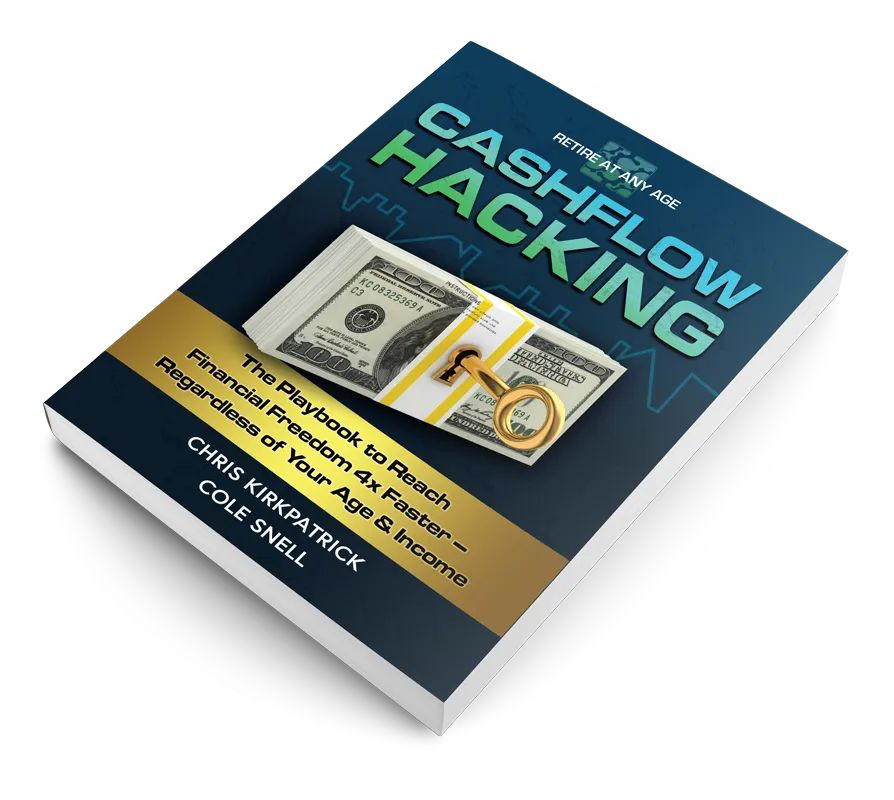
ARE YOU LOOKING FOR:
Cash Flow Hacking teaches you to:
Security to protect your money
Increased cash flow and lifestyle
Inflation protection
Financial certainty in all economic environments
A reduction in taxes
Safe and fast access to your money with no penalties
WHO IS THIS PROGRAM FOR?

People looking for an alternative
Are you looking for alternatives to Wall Street’s “buy and hold” strategy that takes 40 years with uncertain results? Our Cash Flow Hacking strategies provide you the building blocks to get started on the right foot

Passionate Entrepreneurs
Are you looking for a financial strategy that will take your best assets (you and your businesses) and multiply their potential? Our Cash Flow hacking strategies will teach you how to invest for the future without sacrificing building your business

Real Estate
Investors
Are you a real estate investor who is burned out from being a landlord or playing the fix-and-flip game? Our Cash Flow Hacking strategies will provide you with the system to create predictable wealth AND give you the freedom you are looking for.
YOU DESERVE PEACE OF MIND AND A PLAN THAT WILL PROTECT YOUR FAMILY AND GROW YOUR WEALTH
Today you need to be more savvy than ever if you try to go at it alone.
Losing money to inflation, taxes, and just poor investment strategies is leaving you frustrated, feeling out of control and not knowing where to turn. To add to the problem, the market is flooded with advisors who have outdated advice that does not place your best interests first, but instead focuses on charging you a fee that creates guaranteed cash flow for them.
NOT YOU
We believe this is wrong and that your security and best interests should be placed first. We believe you should be in a position where you control your money, your money doesn't control you. We understand because we talk with hardworking people everyday that are losing money in the markets based on old information and feel like they are guessing at the best course of action.
We created the Cash Flow Hacking plan to help you have security and control of your money to take advantage of life's opportunities because you deserve peace of mind with your wealth. The old way of planning for retirement of… Go to school Get a job & save as much as you can in your 401k and mutual funds...is broken.
You have been lied to. Think about it, where else in life does someone tell you that the most certain way to achieve your desired result is to take on more risk? The math just doesn't work, and the results are showing in our country and world. Did you know that 90% of millionaires in the United States have 1 asset in common?
Hint: it's not stocks or mutual funds (and no...it's not crypto) How much sense does it make for you to work hard, save money, reduce your current lifestyle (because that's what you are doing when you save for the future - taking money you could use on lifestyle today and delaying gratification to a future unknown time), and hope that whatever you are doing will work three to four decades from now? If you're thinking, "not much sense at all…", you are in the right place.
With over 50 years of experience on our team, we have worked with thousands of individuals and families to achieve financial freedom faster and with more predictability by helping them invest for Cash Flow.
How does the Cash Flow Hacking Plan work? 1. Take the Cash Flow Hacking Challenge 2. Complete the LIFE180 X-Ray and determine what your Freedom Number is 3. Work with a Cash Flow Hacking expert to provide you a customized plan
The customized Cash Flow Hacking plan will give you clarity on where you are now, where you want to go (and in what time frame), and what you need to do to get there predictably.
We value and commit to you: We believe you deserve the best financial education and guidance We believe financial decisions should not be rushed but be well thought out with a plan We believe you should be in control of your money We believe we earn your trust through time, education, and proper due diligence Without a proper plan and guidance, your money can be lost to taxes, inflation, and bad investments You deserve more with the most up-to-date strategies to mitigate your risk, control your money, and earn stable returns regardless of the market Schedule a call here to attain your LIFE180 Financial X-Ray now or get started with the Cash Flow Hacking Challenge for free.
I am interested in...